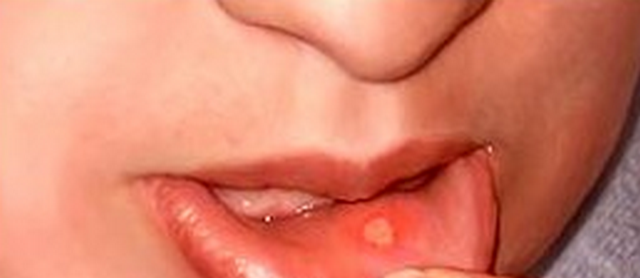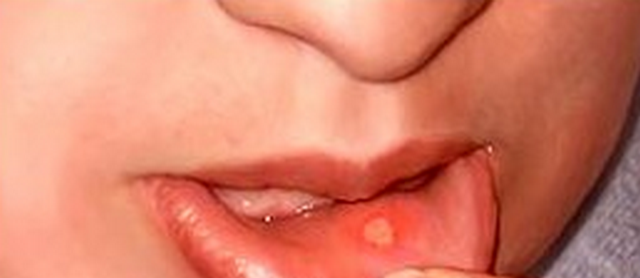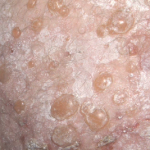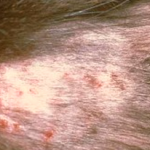Cold sores are clusters of tiny blisters that form in the mouth, on the lip, and around it. They are also referred to as fever blisters.
The skin surrounding the blisters is mostly swollen, reddened, and sore. The blisters tend to rupture, ooze a clear fluid, and develop into an open sore. After a few days the sore scabs over. Cold sores in mouth typically tend to disappear on their own within a week, or two at the most.
Symptoms of cold sore in mouth
Some of the signs and symptoms of a cold sore in mouth are listed below:
- A cold sore in mouth will initially cause pain on the lips, and in and around the mouth. Patients may also experience a sore throat, fever, and/or swelling of the lymph nodes in the neck or at other locations in the body.
- Young children may occasionally drool before the onset of cold sore blisters.
- After the appearance of blisters, the cold sores typically rupture and discharge a clear fluid. The resultant sore eventually crusts over. The blisters finally clear out after lasting for a maximum of about two weeks.
- In some patients the cold sore blisters can cause extreme pain.
It is also important to note that some individuals may be infected by the virus, but they may not develop cold sores in mouth. They may not experience any symptom.
Causes of cold sore in mouth
- A cold sore in mouth is caused by the HSV or the herpes simplex virus. There are two kinds of herpes simplex virus, i.e. HSV-1 and HSV-2. Both of them can result in the formation of cold sores in and around the mouth, namely herpes labialis, and in the genital area, namely genital herpes. The HSV-1 is primarily responsible for oral cold sores.
- The herpes simplex virus generally gains an entry into the body via a break or cut in the skin, or, in or around the mouth. In most cases, the infection spreads from an affected person to another after contact with a cold sore, or with infected fluids. This can happen when kissing an infected individual, exposure to his/her saliva, and/or sharing razors, eating utensils, and towels.
- Parents with a cold sore in mouth often transmit the infection to their children in this manner.
- Cold sore infections and blisters can also migrate to other areas of the body, especially to the fingers and around the eyes.
Diagnosis
Doctors are able to diagnose a case of cold sores just by examining the abnormal blisters. The physician may also ask specific questions to ascertain the manner in which the patient got exposed to the virus.
Tests are mostly not needed. However, if there are any doubts, then the health care provider may collect a sample from a blister and send it to a laboratory for testing.
Treatment of cold sore in mouth
Cold sores in mouth will generally begin healing on their own a few days after eruption, and eventually disappear within two weeks. Hence, treatment is not required.
- Patients may seek treatment for cosmetic reasons, or if the lesions are very painful. Treatment involves the use of oral or topical antiviral medications.
- It may be noted that drug therapy not only helps shorten the duration of cold sores by some days, but also aids in alleviation of discomfort, pain, and other distressing symptoms.
- Serious cases of cold sores in mouth require intravenous administration of antivirals.
There is no known cure for an infection of the herpes simplex virus. Once a person gets infected by the virus, it remains in the body for the remainder of his/her life. People who experience frequent recurrence of cold sores should seek medical treatment to reduce its incidence, and also to decrease the severity levels.

Prevention
The below listed guidelines can help prevent a herpes simplex virus infection and cold sores:
- Do not share personal items such as drinking cups, eating utensils, etc. with a person affected by a cold sore
- Avoid exposure to the infected blister fluids. It can occur when kissing a patient.
People with an underlying HSV infection cannot prevent development of cold sores. They can however follow certain steps to help prevent the frequency of outbreaks, as well as its spread to other body parts or to others:
- Avoid touching the sore. Wash the hands after every few hours. These practices will help prevent the migration of infection to the eyes or other parts of the body, or to other people.
- Avoid the factors which can trigger an episode of cold sores in mouth, such as stress, exhaustion, flu or cold, etc.
- Excessive exposure to sunlight can also result in a flare up of cold sores. Hence, always wear a sunscreen and use lip balm when venturing out into hot weather.
- Patients with persistent recurrence of cold sores need to take prescription antivirals and other medications on a regular basis.


